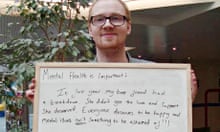When I started my second year of university, I knew that something wasn't quite right. It was only as the weeks progressed that I began to become aware of what was going on.
I felt tired during the day, I didn't enjoy being around people as much as I had done previously and although I had always been emotional and prone to crying, suddenly my tears were uncontrollable. I needed help.
After being at home for the summer, I was looking forward to going back to university. Not only had I made some great friends in my first year but I enjoyed my course and was excited to be moving into a house with some of my closest friends.
Why, then, did my excitement not amount to anything when I returned to university? I began to feel as though I was merely existing each day and not living them. I felt an overwhelming sense of sadness and I wasn't sure why.
After realising that I wasn't myself and that the first term was slipping through my fingers, I decided to make a positive move by seeking a university counsellor.
My parents were unable to help me (although they tried), my friends were confused by my incessant crying and I couldn't explain to anybody what it was that was making me feel so lost.
A counsellor is somebody that has no preconceived perceptions of you, doesn't know who you are and has no prior connection to your life. It was with this in mind that I sought a counsellor and was put on a waiting list.
As each day passed I found myself becoming more and more of a shell of my former self and although I put on a front to the majority of my friends, my mask was beginning to fall. Although there were daily drop-in sessions, I had to wait weeks to be able to be seen regularly.
This brought me to realise that, with the number of students seeking a counsellor having risen by a third since 2008, universities need to be able to accommodate the increase.
When I first started counselling, I was contracted for six sessions but this was not enough and I was given more. The counsellor realised that I had more to speak about. Everybody has thoughts and questions they don't dare ask themselves and in that room, for 50 minutes on a Wednesday morning, I was able to confront and answer them with no judgement from the person sitting opposite me.
Without realising it, each week I cried a little less and with each session it became easier for me to talk about what I had been repressing for so many years. In fact, at my last ever counselling session, I had nothing left to say after just 20 minutes.
I no longer felt the heavy burden of sadness that I had felt before. The counsellor asked me if there was anything else I wished to talk about in my life and for the first time I was able to answer with an honest "no".
My only wish is that more students seek counselling when they are in need. University students face so much at such a rapid speed. We are, after all, accelerated through three years of friendship-making, exams, parties, homesickness and more in such a small amount of time that we are barely able to catch our breath.
Sometimes we just need to talk to somebody that doesn't know who we are so that we are able to learn more about ourselves.
Am I the same person that I was before counselling? No. I never will be. I left that person behind in the dimly lit counselling office. I left my demons there and I only hope that they won't follow me out any time soon. However, if they do, I will know that the door is open for me to go back and fight them off again like I did the first time.
Counselling isn't for everybody, but it helped me and I hope it continues to help those who seek it. Don't be afraid of the stigma surrounding seeking help. We all need it from time to time.






Comments (…)
Sign in or create your Guardian account to join the discussion